WHEN a chief tears up while recounting the preventable death of a 22-year-old from one of the villages he traditionally governs, he leaves no doubt that he genuinely cares for his people and wants nothing but the best for the next generation.

The Vunivalu (Naduru) and Tui Kuku, Ratu Manasa Kalounivutia, was discussing the high number of deaths in his village, with him having to transport six villagers to the hospital, since he took up his traditional position of leadership some three years ago, after 35 years in Australia.
Ratu Manasa visited the subdivisional health authorities to find answers to what he felt were too many and seemingly premature deaths. Health authorities attributed most of the fatal cases to the propensity to ferry the sick to hospitals when it was too late for effective medical intervention.
The tipping point for Ratu Manasa was when 22-year-old Saimoni died because he was essentially taken to hospital too late. "I know there are those who would have been still alive today," Ratu Manasa said quietly.
During a village meeting in March 2014, Ratu Manasa who had by then registered the Naduru Women's Club and the Naduru Youth Club discussed the grave need for a village dispensary, also referred to as wellness centre, and announced this would be the youth group's project for the year.
A month later, the UNDP (United Nations Development Program) UNFPA (United Nations Population Fund) and UNOPS (United Nations Office for Project Services) executive board visited Kuku during which the young people discussed potential assistance for their village project with UNFPA Pacific Sub-Regional Office assistant representative Virisila Raitamata.
It was the beginning of talks which led to the funding assistance which saw an extension of the Naduru Village hall that now serves the district of Kuku. Discussions with health authorities will now see a monthly visit to the village from subdivisional nurses.

Youth club vice-president Amenatave Damuni said the project hadwbeen an empowering experience for the members considering it was their first project which they administered from beginning to end. Damuni said the wellness centre brought young people out of their "comfort zone".
"We will benefit a lot from this wellness centre. We are also now, through this centre, able to reach out to young people in the community to create awareness on issues like teenage pregnancy which was increasing in the village, and sexually-transmitted infections," Damuni said.
"We wouldn't have been able to do it though without the leadership we received from our chief. The visit of the UNDP/UNFPA /UNOPS executive board was also very timely for us, we were very lucky."
Raitamata officially opened the wellness centre on January 16. Raitamata said that if there was anything that ensured the success of the project, it was the leadership and guidance the young people received from Ratu Manasa.
"It goes without saying that the community must own such projects, and they often do if it is something they have identified themselves but very important for its actual success is the leadership from their chiefs," Raitamata said.
Ratu Manasa has a soft spot for the young people. He spends time with them and walks the extra mile for those who appear to be introverts and those who didn't or don't show much interest in communal activities other young people participate in.
"Leadership is a lot more than just a title, you may have the title but without a vision you cannot be a leader; all around Fiji, we need leaders," Ratu Manasa said.
"For us old people, we maybe have two more promotions - from here to the cemetery but teach the young people, they are the future leaders whether we like it or not, that's why I spend time with them."
Ratu Manasa recognises the socioeconomic and spiritual influencers that have informed the worldview of the youth in the villages he is the traditional leader of. He categorises the different groups of people in his vanua as colonial generation (his contemporaries, in their 60s), the independence generation, the republic generation, the democracy generation and the coup generation.
"People in my traditional positions do not have ministries to work for them so I registered the youth and women's clubs because I saw them as platforms from which the village and district development could be driven from," he said.
"I saw how our young people were just floating around like islands and so I tried to gather them. And now they have achieved their project, which will not only benefit the village the wellness centre is in (Naduru) but those in the surrounding area are easily accessible to it."
Ratu Manasa warned against fanatical culturalism which could potentially be regressive. Ratu Manasa says people in leadership at community level who refused the input of the different groups within their communities, those in particular who failed to harness the capacity of their youth, could be barriers to growth.
"My concern is youth who have gone through so much that they already represent different generations. Some just need to know that someone cares for them and what they think. I spend time with them because they are our future," Ratu Manasa said.
UNFPA Pacific Sub-Regional Office director and representative Dr Laurent Zessler said the achievement of the Naduru youth club was exemplary.
"As an organisation, youth are one of our core mandate areas and we are very proud to be associated with this project because it has been wholly driven by the youth with the critical element of leadership which allowed them the space to practically learn," Dr Zessler s


